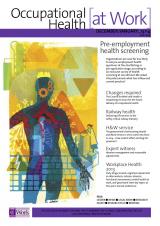December/January 2013/2014 (vol. 10/4)
ContentsFeaturesNewsLegal
NewsResearch DigestResearch PlusCPD
Research Plus
National return-to-work programme
A randomised controlled trial involving more than 3,000 participants in three Danish municipalities suggests that a multi-component government-funded return-to-work (RTW) programme can be effective in getting people back to work and off sickness benefits but success or failure depends on socio-demographic and administrative factors. The Danish RTW programme is delivered by trained RTW teams and provides coordinated, tailored and multidisciplinary interventions to people sick-listed for any reason, and regardless of employment status (employed, self-employed, temporary or unemployed). The trial participants were all working-age adults in receipt of long-term (greater than eight weeks) sickness benefits. RTW was significantly improved in one of the municipalities (HR = 1.51; CI 1.31–1.74) but there were no significant improvements in the other two. There was a significant intervention effect between the three regions (p < 0.00005), which the authors put down to ‘profound’ differences between the municipalities, including socio-demographic factors and the way the administrations interpret and manage benefits legislation.
Effect of the Danish return-to-work program on long-term sickness absence: results from a randomized controlled trial in three municipalities. Scandinavian Journal of Work, Environment and Health 2013; online first: doi: 10.5271/sjweh.3383.
Occupational Health at Work December/January 2013/2014 (vol. 10/4) pp46



